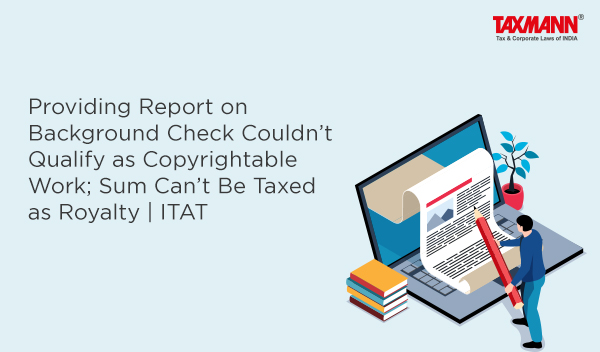Providing Report on Background Check Couldn’t Qualify as Copyrightable Work; Sum Can’t Be Taxed as Royalty | ITAT
- Blog|News|International Tax|
- 2 Min Read
- By Taxmann
- |
- Last Updated on 21 November, 2023

Case Details: Hire Right Ltd. v. ACIT - [2023] 156 taxmann.com 72 (Delhi-Trib.)
Judiciary and Counsel Details
-
- G.S. Pannu, President & Ms Astha Chandra, Judicial Member
- Ajay Vohra, Sr. Adv., Kishore Kunal, Manish Rastogi & Shubham Bajaj, Advs. for the Appellant.
- Vizay B. Vasanta, CIT-DR for the Respondent.
Facts of the Case
The assessee, a UK tax resident, was engaged in providing human resource background screening services. Services include pre-employment background screening, employment, education, verification, and investigative due diligence services. The Assessing Officer (AO) noticed that copyright laws protected the reports provided by the assessee. Therefore, the AO contended that the use of such reports by the clients would result in the use of copyright. He taxed the sum received as royalty.
The Dispute Resolution Panel (DRP) upheld the findings of AO. The matter reached before the Delhi Tribunal.
ITAT Held
The Tribunal held that as per the agreement, the assessee’s role was restricted to verification of the information concerning various candidates proposed to be hired by its clients (viz. educational qualifications, past employment details, etc.) and providing the clients with the relevant facts captured by the assessee during validation. The said information did not involve imparting any kind of commercial experience, skill or expertise.
The source of information used for verification of the details may be available in the public domain or obtained telephonically from the previous employers of the candidates and, in some cases, even the records of the courts/public authorities. It was also evident that the assessee physically verified the information or data in relation to screening services. The reports generated thereof were delivered to the clients in physical mode or through online access.
The assessee did not provide any advice, analysis, or recommendation on the hiring of the employees by its client and did not assume any responsibility with regard to hiring decisions made by its clients based on the assessee’s report. No copyright protects the information collected by the assessee, but its circulation is regulated under the UK and other local laws.
None of the requisites under article 13(3) of the India-UK DTAA are satisfied to qualify such receipts as ‘royalty’. What the assessee is providing to the clients in India was merely a report summarising its findings with respect to the background check undertaken by the assessee. It was primarily factual data and cannot per se qualify as literary or artistic or any other copyrightable work. Such a report cannot be copyrighted as it does not fulfil the requirements enlisted under section 13(1)(a) of the Indian Copyright Act, 1957.
Thus, the receipts of the assessee from its clients in India cannot be regarded as ‘Royalties’ under Article 13.
List of Cases Reviewed
-
- Engineering Analysis Centre of Excellence (P.) Ltd. v. CIT [2021] 125 taxmann.com 42/281 Taxman 19/432 ITR 471 (SC) (para 12) followed.
List of Cases Referred to
-
- Engineering Analysis Centre of Excellence (P.) Ltd. v. CIT [2021] 125 taxmann.com 42/281 Taxman 19/432 ITR 471 (SC) (para 12).
Disclaimer: The content/information published on the website is only for general information of the user and shall not be construed as legal advice. While the Taxmann has exercised reasonable efforts to ensure the veracity of information/content published, Taxmann shall be under no liability in any manner whatsoever for incorrect information, if any.

Taxmann Publications has a dedicated in-house Research & Editorial Team. This team consists of a team of Chartered Accountants, Company Secretaries, and Lawyers. This team works under the guidance and supervision of editor-in-chief Mr Rakesh Bhargava.
The Research and Editorial Team is responsible for developing reliable and accurate content for the readers. The team follows the six-sigma approach to achieve the benchmark of zero error in its publications and research platforms. The team ensures that the following publication guidelines are thoroughly followed while developing the content:
- The statutory material is obtained only from the authorized and reliable sources
- All the latest developments in the judicial and legislative fields are covered
- Prepare the analytical write-ups on current, controversial, and important issues to help the readers to understand the concept and its implications
- Every content published by Taxmann is complete, accurate and lucid
- All evidence-based statements are supported with proper reference to Section, Circular No., Notification No. or citations
- The golden rules of grammar, style and consistency are thoroughly followed
- Font and size that’s easy to read and remain consistent across all imprint and digital publications are applied



 CA | CS | CMA
CA | CS | CMA
